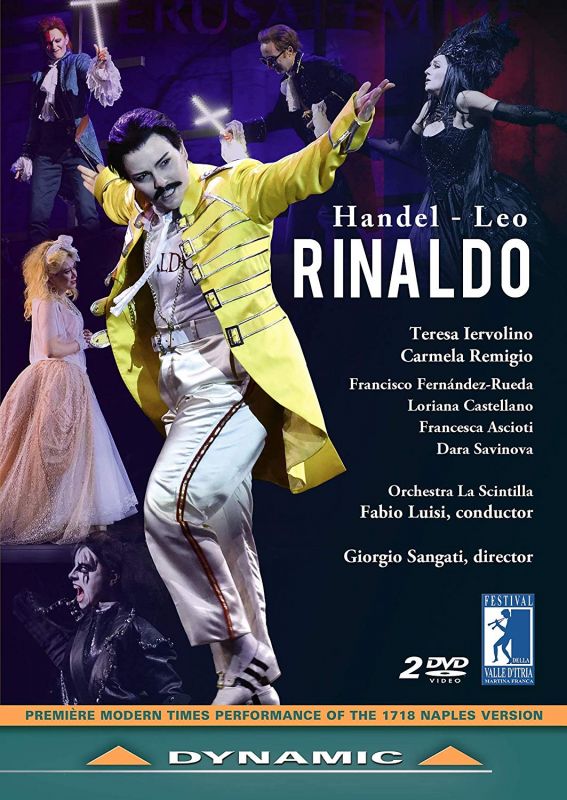HANDEL; LEO Rinaldo (Premiere of the 1718 Naples version)
View record and artist detailsRecord and Artist Details
Composer or Director: George Frideric Handel
Genre:
Opera
Label: Dynamic
Magazine Review Date: 06/2019
Media Format: Digital Versatile Disc
Media Runtime: 216
Mastering:
DDD
Catalogue Number: 37831

Tracks:
| Composition | Artist Credit |
|---|---|
| Rinaldo |
George Frideric Handel, Composer
Ana Victória Pitts, Wiseman Carmela Remigio, Armida, Soprano Dara Savinova, Eustazio, Mezzo soprano Dielli Hoxha, Argante's Herald Fabio Luisi, Conductor Francesca Ascioti, Argante, Contralto Francisco Fernández-Rueda, Goffredo, Tenor George Frideric Handel, Composer Kim-Lillian Strebel, Spirit La Scintilla Loriana Castellano, Almirena, Mezzo soprano Simone Tangolo, Nesso, Singer Teresa Iervolino, Rinaldo, Mezzo soprano Valentina Cardinali, Lesbina, Singer |
Author: Richard Wigmore
The original Rinaldo prioritised scenic spectacle – especially magic transformations – over dramatic coherence. Not surprisingly, the 1718 Naples pasticcio, recorded at the Valle d’Itria Festival in Martina Franca, is no less arbitrary. Giorgio Sangati’s staging, mixing (vaguely) 18th-century costumes, Venice carnival masks and modernist camp, is unpretentious and uncluttered. The substitute arias, often short-breathed, cannot rival Handel’s energy and melodic breadth, and a few outstay their welcome. But they are effective enough, if sometimes too tepid for character and situation. There’s a glaring incongruity in the final scene, for instance, where the condemned sorceress Armida – unrepentant in the Naples adaptation – rails against the Christians in a decorous Bononcini aria.
The 1718 cast included the Neapolitan castrato Nicolo Grimaldi (‘Nicolino’), who had sung the title-role for Handel, plus assorted contraltos in the roles of Rinaldo’s beloved Almirena (originally a soprano), the saracen king Argante and Goffredo’s brother Eustazio. Here Rinaldo is not taken by a countertenor – which would have provided more vocal variety – but by the contralto Teresa Iervolino. If her style and vibrant, almost fruity timbre seem better suited to later music, she is a powerful, involving presence, singing an impassioned ‘Cara sposa’ and deploying ringing top notes in a vehement ‘Mio cor’, originally composed for Goffredo. Rinaldo also appropriates Almirena’s famous sarabande aria ‘Lascia chi’io pianga’, to different words.
Cast as a contralto, Almirena here presents a more feisty figure than in Handel’s original. Armed with a formidable chest register, Lorania Castellano sings the role with spirit and subtlety. The Armida, Carmela Remigio, looks more comic than menacing in her mannered gestures, but brings plenty of vocal power and temperament to the part. I didn’t much care for the dry, monochrome tenor singing Goffredo or the over-the-top rasps and plunges from the Argante, here too much the pantomome villain. In the small role of Eustazio, Dara Savinova makes her mark with bright, incisive tone and an elegant sense of style.
Once or twice I thought the rhythms jogged too comfortably, with an over-weighted bass line. But on the whole Fabio Luisi judges tempo and character well and gets spruce playing from his band. As an entertaining snapshot of the 18th-century Italian opera business, complete with stylistic inconsistencies, this performance serves well enough. Just don’t expect more than a smattering of Handel.
Discover the world's largest classical music catalogue with Presto Music.

Gramophone Digital Club
- Digital Edition
- Digital Archive
- Reviews Database
- Full website access
From £8.75 / month
Subscribe
Gramophone Full Club
- Print Edition
- Digital Edition
- Digital Archive
- Reviews Database
- Full website access
From £11.00 / month
Subscribe
If you are a library, university or other organisation that would be interested in an institutional subscription to Gramophone please click here for further information.




